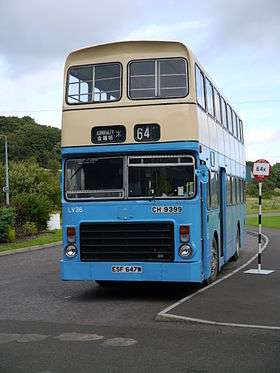Leyland Victory Mark 2
The Leyland Victory Mark 2 was a front-engined double-decker bus chassis manufactured by Leyland between 1978 and 1981. Like its competitor the Dennis Jubilant it was specifically designed for the contemporary operating environment (hilly roads and one-person operation with a farebox) in Hong Kong.
| Leyland Victory Mark 2 | |
|---|---|
 Preserved China Motor Bus Victory Mark 2 in Scotland in September 2012 | |
| Overview | |
| Manufacturer | Leyland |
| Production | 1978-1981 |
| Body and chassis | |
| Doors | 2 |
| Floor type | Step entrance |
| Powertrain | |
| Engine | Gardner 6LXB |
| Transmission | Voith DIWA 851 Self-Changing Gears GB350 |
| Dimensions | |
| Length | 9.7 metres |
| Chronology | |
| Successor | Leyland Olympian (indirect) |
The chassis was developed from the Guy Victory J, which was also chosen by Bus Bodies (South Africa) for the development of its own double-decker. Four examples were delivered to Kowloon Motor Bus for evaluation.[1] It could be fitted with Gardner 6LXB engine and Voith D851 gearbox, but one Victory Mark 2 for China Motor Bus had been experimentally fitted with Self-Changing Gears GB350 gearbox.
Almost all Leyland Victory Mark 2s built for Hong Kong were fitted with Alexander bodywork, but the last 20 buses built for China Motor Bus were fitted with Duple Metsec bodywork.
Elsewhere, single-deck versions of the Guy Victory were also operated in Southeast Asian cities like Singapore, Kuala Lumpur and Penang.[2]
Operators
Kowloon Motor Bus (KMB) introduced 540 Victory Mark 2s between 1979 and 1983, including one unsuccessful air-conditioned coach which later had the air-conditioning unit removed.[3][1] China Motor Bus (CMB) purchased 167 Victory Mark 2s between 1979 and 1982.[4][5][6] New Lantao Bus (NLB) also purchased nine between 1980 and 1983, with a further six buses acquired from KMB in later years. In 1993 NLB sold 10 of its Victory Mark 2s to Citybus which took over 26 routes from CMB on 1 September 1993.[7]
This model of double-decker bus has served nearly all regions in Hong Kong, including New Territories, Kowloon, Hong Kong Island, and Lantau Island.
All NLB and Citybus's Victory Mark 2s were withdrawn in the mid-1990s. KMB withdrew its last Victory Mark 2 in early 1998. CMB operated Victory Mark 2s until the takeover of its routes and vehicles, by New World First Bus on 1 September 1998, the ex-CMB Victory Mark 2s were gradually replaced by new low-floor buses, the last Victory Mark 2s were withdrawn on 31 August 2000.
Four Citybus Victory Mark 2s became service vehicles after withdrawal, whilst some withdrawn KMB/CMB Victory Mark 2s were sold on for use in rescue training.
Accidents
Leyland Victory Mark 2 has a notorious reputation as an unsafe bus, mainly due to its soft suspension and high centre of gravity, which makes it prone to overturning.
| Date | Company & Fleet number | Route | Accident type | Location |
|---|---|---|---|---|
| 29 August 1980 | CMB LV11 | 4 | rollover | Pok Fu Lam Road near Pok Fu Lam Tsuen |
| 1 December 1980 | KMB G217 | 70 | rollover | junction between Nathan Road and Waterloo Road, Kowloon |
| 23 August 1981 | KMB G94 | 66M | collision & fire | Tuen Mun Road near Sham Tseng |
| 24 November 1981 | KMB G58 | 45 | rollover | junction between Fat Kwong Street and Chung Hau Street |
| 25 January 1982 | KMB (unknown) | 36M | rollover | junction between Castle Peak Road and Wo Yi Hop Road |
| 17 August 1982 | KMB (unknown) | 85 | rollover | Lion Rock Tunnel Road |
| 12 October 1982 | KMB G442 | 48 | rollover | junction between Tai Wai Road and Lion Rock Tunnel Road |
| 14 November 1982 | KMB G440 | 60M | rollover | Tuen Mun Road near Siu Lam |
| 2 February 1985 | KMB G208 | 82M | rollover | junction between Lion Rock Tunnel Road and Tai Chung Kiu Road |
| 10 April 1985 | KMB G224 | 72 | rollover | Tai Po Road near Caldecott Road |
| 5 November 1986 | KMB G470 | 61A | rollover | junction between Ming Kum Road and Shek Pai Tau Road, Tuen Mun |
| 17 March 1990 | CMB LV21 | 94 | rollover | Ap Lei Chau Bridge (exit at Aberdeen side) |
| 9 October 1991 | KMB G493 | 43X | rollover | entrance of Tsuen Wan Ferry Pier bus terminus |
| 25 July 1993 | KMB G305 | 69M | rollover | junction between Hung Tin Road and Ping Ha Road |
| June 1996 | KMB G159 | 76K | deroof | San Tam Road |
Preservation
Some of the ex-China Motor Bus Victory Mark 2s had been saved for preservation. LV2, LV30 and LV158 are preserved in Hong Kong, LV36 was donated to Scottish Vintage Bus Museum.
Trivia
- Leyland Victory Mark 2 was also known as "chicken" in Hong Kong because its soft suspension made it behave like a chicken when accelerating or decelerating.
References
- "Hong Kong Buses Part 3: Kowloon Motor Bus" Fleetline issue 249 July 1997 page 112
- York, FW; Davis, Mike; Phillips, Ron (2005). Singapore Buses Volume 1 Singapore Bus Service Part 1. DTS Publishing. ISBN 9781900515757.
- All due credit Commercial Motor 15 September 1978
- Tradition wins CMB 'Commercial Motor 30 March 1979
- Leyland for Hong Kong Commercial Motor 10 November 1979
- "Hong Kong Buses Part 1: China Motor Bus Co" Fleetline issue 247 March 1997 page 50
- "Hong Kong Buses: Part 2 Citybus Limited" Fleetline issue 248 May 1997 page 93
- Lee Tin Yau (2001). Leyland Victory 2. Northcord International Limited. ISBN 962-920-034-1.